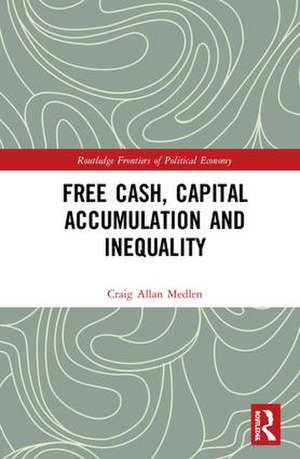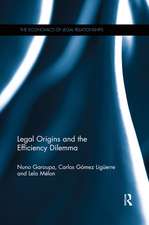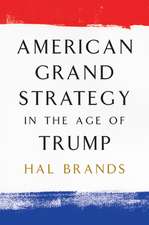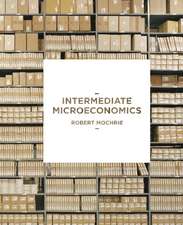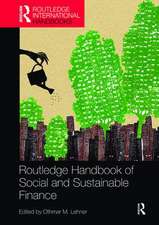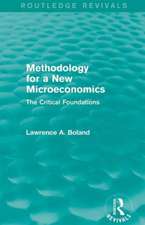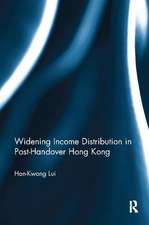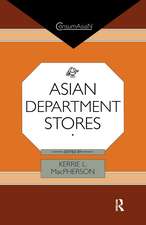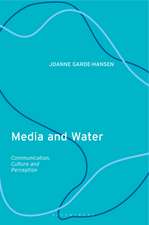Free Cash, Capital Accumulation and Inequality: Routledge Frontiers of Political Economy
Autor Craig Allan Medlenen Limba Engleză Hardback – 13 sep 2018
Over seventy years ago, Michal Kalecki derived the mathematical relationship between government deficits, the external trade account and free cash—defined as the gross profit over and above that portion ploughed back into new investment. Since then, the free cash literature has remained largely within an industrial organizational context where free cash theory has helped to explain mergers. In contrast, this book, revisits Kalecki’s free cash construction at the macro and global level and explores the various causes and effects of free cash on the economy. As part of this examination, the author highlights the historical uses of free cash in imperialist adventures, mergers and speculative endeavours. In addition to developing a new relative valuation measure of capital accumulation, he also utilizes a neo-Kaleckian model to help explain the U.S. slowdown in investment since the late 1960s, the increasing inequality of wealth and income and the recent speculative episodes associated with the spillage of free cash. Finally, based on these models the book argues for heightened taxes on the wealthy and an increased role for government investment in health care and energy.
Free Cash, Capital Accumulation and Inequality offers an explanation as to how wealth and income inequalities have fashioned, and been fashioned by, various historical episodes right up to the present. It will be of great interest to those studying and researching in the field of economic analysis.
| Toate formatele și edițiile | Preț | Express |
|---|---|---|
| Paperback (1) | 256.78 lei 6-8 săpt. | |
| Taylor & Francis – 30 iun 2020 | 256.78 lei 6-8 săpt. | |
| Hardback (1) | 763.31 lei 6-8 săpt. | |
| Taylor & Francis – 13 sep 2018 | 763.31 lei 6-8 săpt. |
Din seria Routledge Frontiers of Political Economy
-
 Preț: 309.90 lei
Preț: 309.90 lei -
 Preț: 309.79 lei
Preț: 309.79 lei -
 Preț: 316.03 lei
Preț: 316.03 lei -
 Preț: 310.95 lei
Preț: 310.95 lei - 9%
 Preț: 866.82 lei
Preț: 866.82 lei -
 Preț: 309.12 lei
Preț: 309.12 lei -
 Preț: 311.61 lei
Preț: 311.61 lei -
 Preț: 286.99 lei
Preț: 286.99 lei -
 Preț: 327.83 lei
Preț: 327.83 lei -
 Preț: 311.87 lei
Preț: 311.87 lei -
 Preț: 302.76 lei
Preț: 302.76 lei - 9%
 Preț: 938.48 lei
Preț: 938.48 lei -
 Preț: 152.67 lei
Preț: 152.67 lei -
 Preț: 151.97 lei
Preț: 151.97 lei -
 Preț: 318.54 lei
Preț: 318.54 lei -
 Preț: 317.95 lei
Preț: 317.95 lei -
 Preț: 310.01 lei
Preț: 310.01 lei -
 Preț: 326.49 lei
Preț: 326.49 lei -
 Preț: 155.44 lei
Preț: 155.44 lei -
 Preț: 309.79 lei
Preț: 309.79 lei -
 Preț: 328.76 lei
Preț: 328.76 lei -
 Preț: 281.72 lei
Preț: 281.72 lei -
 Preț: 286.58 lei
Preț: 286.58 lei -
 Preț: 386.12 lei
Preț: 386.12 lei -
 Preț: 353.78 lei
Preț: 353.78 lei -
 Preț: 325.09 lei
Preț: 325.09 lei -
 Preț: 310.55 lei
Preț: 310.55 lei -
 Preț: 387.03 lei
Preț: 387.03 lei -
 Preț: 324.87 lei
Preț: 324.87 lei -
 Preț: 312.86 lei
Preț: 312.86 lei -
 Preț: 374.16 lei
Preț: 374.16 lei -
 Preț: 329.09 lei
Preț: 329.09 lei -
 Preț: 348.22 lei
Preț: 348.22 lei - 28%
 Preț: 1047.06 lei
Preț: 1047.06 lei - 18%
 Preț: 1169.45 lei
Preț: 1169.45 lei - 18%
 Preț: 1555.17 lei
Preț: 1555.17 lei - 18%
 Preț: 1048.43 lei
Preț: 1048.43 lei - 18%
 Preț: 1059.84 lei
Preț: 1059.84 lei - 31%
 Preț: 767.47 lei
Preț: 767.47 lei - 18%
 Preț: 731.92 lei
Preț: 731.92 lei - 28%
 Preț: 822.54 lei
Preț: 822.54 lei - 18%
 Preț: 1796.21 lei
Preț: 1796.21 lei - 29%
 Preț: 1184.91 lei
Preț: 1184.91 lei - 18%
 Preț: 1120.23 lei
Preț: 1120.23 lei - 15%
 Preț: 700.95 lei
Preț: 700.95 lei - 18%
 Preț: 1116.31 lei
Preț: 1116.31 lei - 25%
 Preț: 299.52 lei
Preț: 299.52 lei
Preț: 763.31 lei
Preț vechi: 1102.26 lei
-31% Nou
Puncte Express: 1145
Preț estimativ în valută:
146.08€ • 158.62$ • 122.70£
146.08€ • 158.62$ • 122.70£
Carte tipărită la comandă
Livrare economică 22 aprilie-06 mai
Preluare comenzi: 021 569.72.76
Specificații
ISBN-13: 9781138051447
ISBN-10: 1138051446
Pagini: 188
Ilustrații: 23 Line drawings, black and white; 5 Tables, black and white; 23 Illustrations, black and white
Dimensiuni: 156 x 234 x 15 mm
Greutate: 0.4 kg
Ediția:1
Editura: Taylor & Francis
Colecția Routledge
Seria Routledge Frontiers of Political Economy
Locul publicării:Oxford, United Kingdom
ISBN-10: 1138051446
Pagini: 188
Ilustrații: 23 Line drawings, black and white; 5 Tables, black and white; 23 Illustrations, black and white
Dimensiuni: 156 x 234 x 15 mm
Greutate: 0.4 kg
Ediția:1
Editura: Taylor & Francis
Colecția Routledge
Seria Routledge Frontiers of Political Economy
Locul publicării:Oxford, United Kingdom
Public țintă
Postgraduate and UndergraduateCuprins
List of Figures. List of Tables. Acknowledgments. 1. Prologue and Preview. 2. Michal Kalecki’s Derivation of Free Cash. 3. Hobson’ Choice: Free Cash Export or Domestic Redistribution. 4. Free Cash and the Stock Bubble of the 1920s. 5. Veblen’s Q-Tobin’s Q and Relative Valuation. Appendix 1 Expansion of Cash Through New Investment. 6. Stagnation and Free Cash: A Neo-Kaleckian Model. 7. The Multinational Escape. Appendix 2 Multinational Deficits and Parents' Embeddedness. 8. Free Cash, Relative Valuation and Inequality. 9. Crossing the Boundary Line. Index
Notă biografică
Craig Allan Medlen is Professor of Economics at Menlo College, in California. He graduated with a B.A. in Economics from University of California Berkeley in 1966 and received his Ph.D from U.C. Santa Barbara in 1973.
Descriere
Over 70 years ago, Michal Kalecki noted that firms could generate free cash. However, literature since then has remained within an industrial organizational context where free cash theory helps explain mergers. In contrast, this book views free cash at the macro and global level, exploring the various causes and effects of free cash on the economy.
